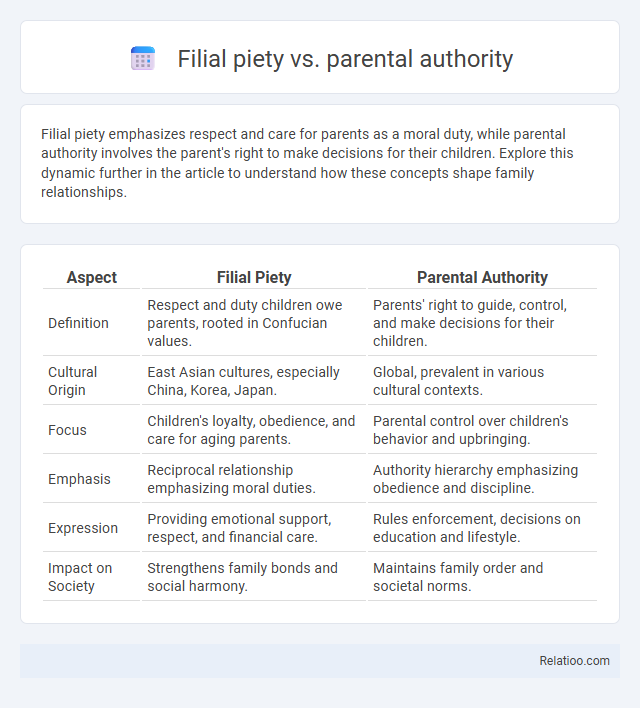Filial piety emphasizes respect and care for parents as a moral duty, while parental authority involves the parent's right to make decisions for their children. Explore this dynamic further in the article to understand how these concepts shape family relationships.
Table of Comparison
| Aspect | Filial Piety | Parental Authority |
|---|---|---|
| Definition | Respect and duty children owe parents, rooted in Confucian values. | Parents' right to guide, control, and make decisions for their children. |
| Cultural Origin | East Asian cultures, especially China, Korea, Japan. | Global, prevalent in various cultural contexts. |
| Focus | Children's loyalty, obedience, and care for aging parents. | Parental control over children's behavior and upbringing. |
| Emphasis | Reciprocal relationship emphasizing moral duties. | Authority hierarchy emphasizing obedience and discipline. |
| Expression | Providing emotional support, respect, and financial care. | Rules enforcement, decisions on education and lifestyle. |
| Impact on Society | Strengthens family bonds and social harmony. | Maintains family order and societal norms. |
Understanding Filial Piety: Cultural and Historical Perspectives
Understanding filial piety requires exploring its deep roots in Confucian philosophy, emphasizing respect, obedience, and care for one's parents as a moral duty. In contrast, parental authority centers on the legal and social rights parents hold over their children, often shaping family dynamics differently depending on cultural context. Your grasp of these distinctions helps navigate the complex interplay between traditional values and modern parenting practices in diverse societies.
The Concept of Parental Authority Across Societies
Parental authority varies significantly across societies, reflecting diverse cultural norms and legal frameworks that shape family dynamics and decision-making processes. Filial piety, deeply rooted in Confucian cultures, emphasizes respect, obedience, and care for parents as a moral duty, contrasting with Western notions of parental authority that often balance child autonomy and parental control. Understanding these differences helps you navigate cross-cultural expectations around family roles and responsibilities, highlighting how societal values influence the concept of parental authority and filial obligations.
Roots of Filial Piety: Confucian Influence and Beyond
Filial piety originates primarily from Confucian philosophy, emphasizing respect, obedience, and care for one's parents as a fundamental moral virtue. Beyond Confucianism, diverse cultural and religious traditions also shape filial obligations, blending reverence with varying degrees of parental authority. The interplay between filial piety and parental authority reflects evolving social norms where respect is balanced against individual autonomy within family hierarchies.
Parental Authority: Evolution and Modern Challenges
Parental authority, historically rooted in cultural and legal traditions, has evolved significantly in response to modern societal changes, including increased child autonomy and shifting family dynamics. Legal frameworks and psychological theories now emphasize a balance between parental control and children's rights, highlighting the need for adaptable discipline strategies in diverse cultural contexts. Understanding Your role in this evolving dynamic helps navigate challenges such as technology influence, multicultural expectations, and the pursuit of mutual respect within the parent-child relationship.
Filial Piety and Parental Authority: Key Differences and Overlaps
Filial piety emphasizes respect, obedience, and care from children toward parents, rooted in Confucian values prioritizing family harmony and moral duty. Parental authority centers on the rights and responsibilities of parents to guide and discipline their children, often supported legally and socially to ensure child development and welfare. Both concepts intersect in promoting family structure and mutual obligations, yet filial piety stresses children's duties based on cultural ethics, while parental authority emphasizes parental control and decision-making power.
Psychological Impact on Children and Adolescents
Filial piety and parental authority significantly shape the psychological development of children and adolescents by influencing their sense of identity, autonomy, and emotional well-being. Excessive parental authority can lead to increased stress, anxiety, and reduced self-esteem, whereas balanced filial piety fosters respect and emotional security without compromising personal growth. Understanding these dynamics helps you support healthy family relationships and promote positive mental health outcomes in young individuals.
Navigating Family Conflicts: Tradition vs. Autonomy
Navigating family conflicts requires balancing filial piety, which emphasizes respect and obedience to parents, with parental authority that demands control and guidance, against the individual's need for autonomy and self-expression. You must understand cultural values that prioritize collective harmony while asserting personal boundaries to prevent clashes rooted in generational expectations. Effective communication strategies promote mutual respect, ensuring that honoring tradition does not undermine individual freedom.
Filial Piety and Parental Authority in Multicultural Contexts
Filial piety and parental authority represent distinct cultural constructs shaping family dynamics, especially in multicultural contexts where values and expectations vary significantly. Filial piety emphasizes respect, obedience, and care for parents as foundational moral duties rooted in Confucian tradition, influencing interpersonal relationships and individual responsibilities within Asian cultures. Your understanding of these divergent norms is crucial for navigating cross-cultural interactions, as parental authority may prioritize hierarchical control and decision-making power, while filial piety centers on reciprocal devotion and harmonious family obligations.
Modern Shifts: The Balance of Respect and Independence
Modern shifts in filial piety emphasize a dynamic balance between deep-rooted respect for parents and the growing need for individual independence. Contemporary parental authority is increasingly characterized by mutual understanding and negotiation rather than unilateral control, reflecting evolving societal values. This balance fosters healthier family relationships by integrating traditional values with modern perspectives on autonomy.
Rethinking Family Dynamics: Toward Healthy Interdependence
Rethinking family dynamics requires balancing filial piety, parental authority, and healthy interdependence to foster mutual respect and emotional support. Filial piety emphasizes honoring and caring for parents, while parental authority involves guiding and protecting children; integrating both concepts encourages open communication and shared decision-making. Your family thrives when roles evolve from rigid control to collaborative relationships that promote autonomy alongside responsibility.

Infographic: Filial piety vs Parental authority
 relatioo.com
relatioo.com